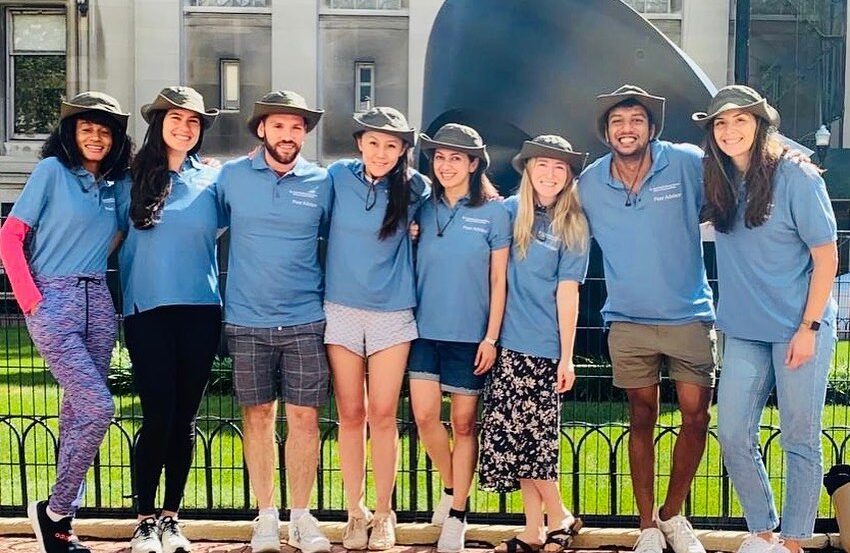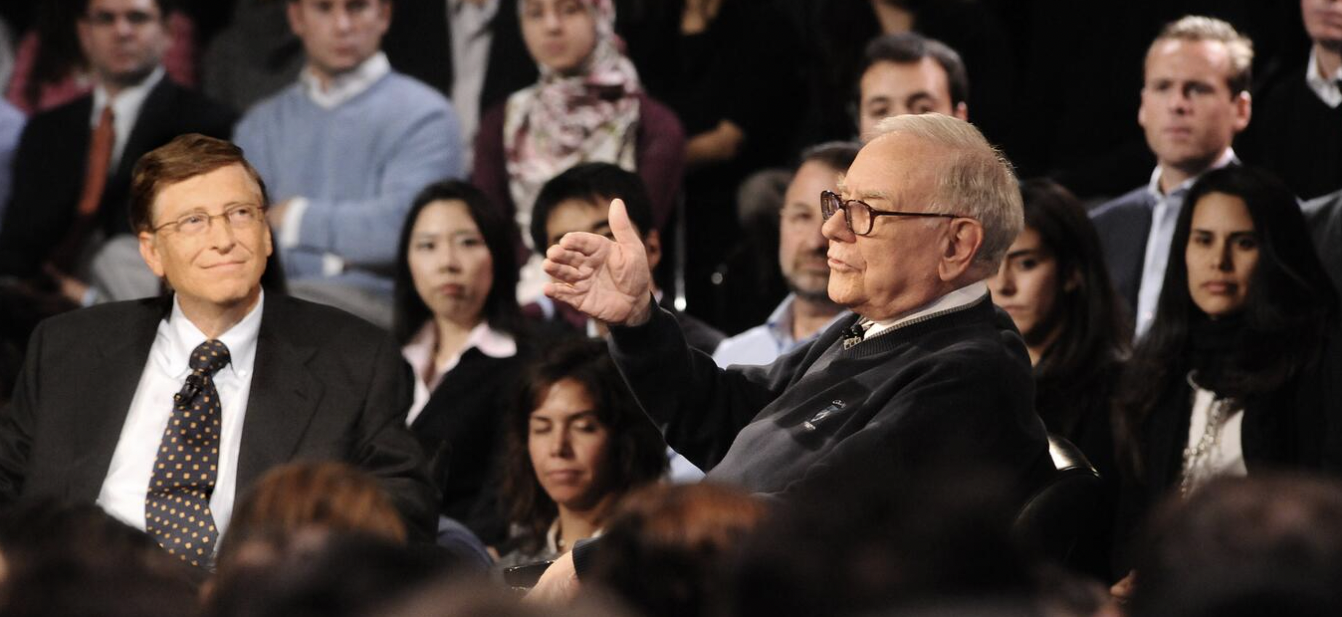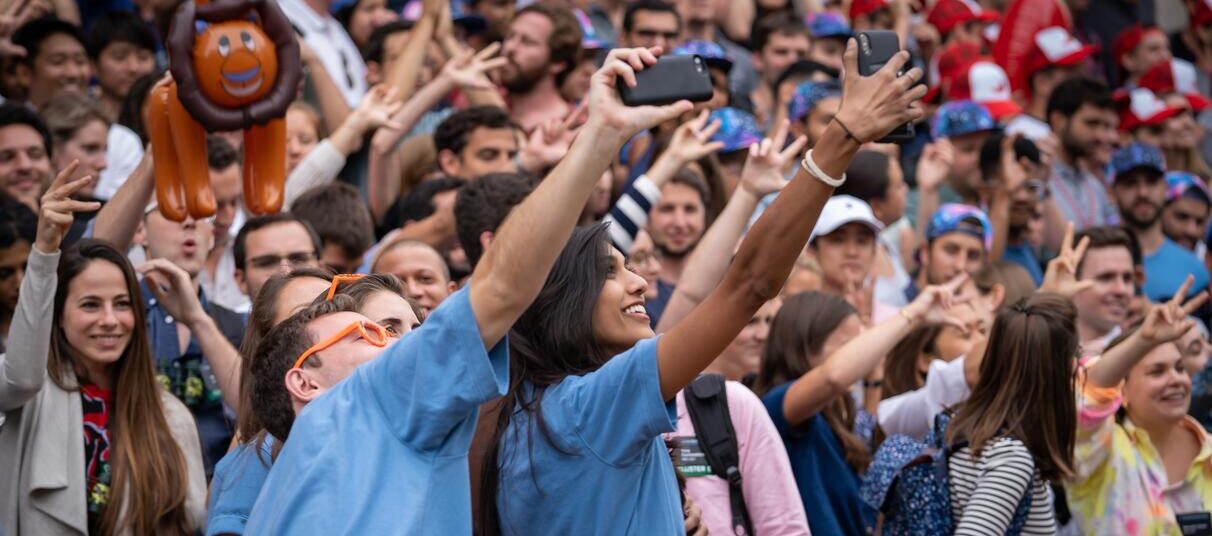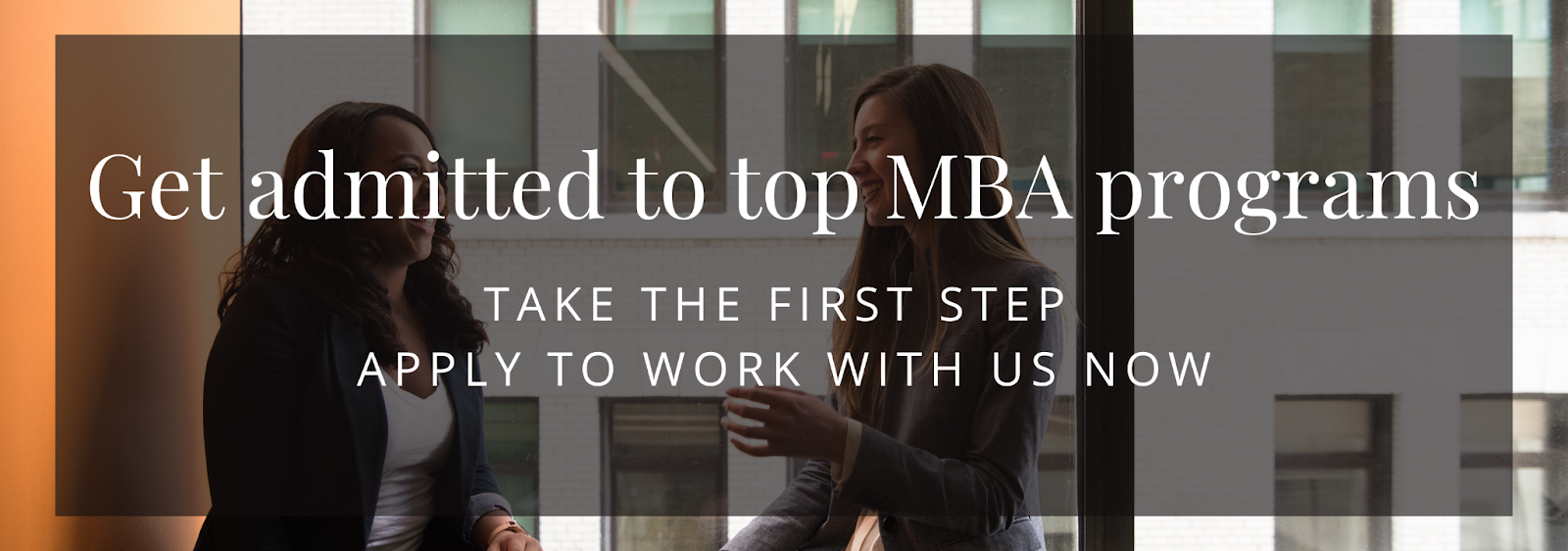- School and Program Overview
- Employment Information
- Is Columbia Right for You?
- Academics at Columbia Business School
- Networking and Extracurricular Activities
- What Makes Columbia Special?
- Columbia Resources To Help You Get Accepted
- Additional MBA Resources To Help You Secure Your Spot
- Get expert help
Here is everything you need to get into Columbia Business School.
This guide is designed to help you make a decision about whether Columbia is a good fit for you. In it, we give an overview of the school and its MBA program, including location, information about the MBA community, and ranking. We then give you a detailed look into the MBA course, including program offerings, extracurricular activities, and post-MBA opportunities.
This guide also includes a wealth of resources that will strengthen your Columbia application, including essay guidelines, interview advice, and letter of recommendation planning support.
We know this guide will be helpful for you and your MBA journey, and we wish you the best in your decision and application process! If you have any questions after reading, please feel free to contact us.
School and Program Overview
Location: New York City, New York
Located in Manhattan, the center of New York City, Columbia is in the heart of the biggest city in the US, with access to some of the biggest companies, especially finance powerhouses, and organizations.
This means that MBA students are immersed in an extremely diverse and urban environment where just about anything is available, from food to museums to networking opportunities. At the same time, living in one of the busiest cities in the world can also be a distraction, as opposed to schools like Stanford GSB or Kellogg, where the campus is more secluded within an academic environment.
New York City is one of the most expensive cities in the world, so budgeting for high living costs is essential when planning to study at Columbia. Off-campus apartments in Manhattan can be costly, with the average monthly rent exceeding $5,000. If you are willing to live a bit farther from campus, however, rent prices decrease; for example, the average rent in Brooklyn is around $28,61. Columbia also provides on-campus housing options for graduate students, with apartments costing anywhere from $1,550 (for a studio) to $2,500 (for a two-bedroom apartment) per month.
Overall, Columbia’s location is one full of opportunities and unique experiences that can only be found in NYC, but you will have to reflect on whether a very fast-paced urban experience matches your needs and desires.
Columbia’s Community
Columbia is a collaboratively-minded university that values diversity, intellect, and strong leadership. As the Columbia admissions team says, “Only Columbia Business School gives you the opportunity to shape your career in the very center of business. There’s something about being positioned in New York City, where access to leaders across industries is truly advantageous. Here you will learn to take on challenges and respond dynamically. You’ll gain skills to succeed in fast-moving, competitive environments anywhere.”

Photo courtesy of @columbia_biz on Instagram
Columbia tends to value high-achieving students from a wide range of professional backgrounds who demonstrate humility. While courses and opportunities promote individual growth, students are also encouraged and expected to take part in group projects and extracurricular activities to develop their interpersonal skills.
Class Size and Demographics
Out of 7,487 applicants for the Class of 2026, 972 were enrolled. With such a large class size, Columbia divides it into clusters (for this class, 14 of them) that take all core courses together, making the social experience easier to navigate.
44% of Columbia’s Class of 2026 are women, and 44% represent US minority demographics. The demographics of American students are listed in the chart below:
 Photo courtesy of gsb.columbia.edu
Photo courtesy of gsb.columbia.edu
46% of Columbia’s Class of 2026 is international students.
In general, Columbia tends to admit applicants with 5 years of work experience. Most Columba MBA students tend to come from finance (30%) and consulting (25%) backgrounds, although a wide range of industries is represented, as illustrated in the chart below:
 Photo courtesy of gsb.columbia.edu
Photo courtesy of gsb.columbia.edu
The average GMAT score for the Class of 2026 was 732. The average GRE score was 162 Quant, 162 Verbal.
Tuition
Currently, the annual tuition at Columbia is $88,300.
With living expenses and academic fees included, that number goes up to around $132,258 for an individual.
 Photo courtesy of gsb.columbia.edu
Photo courtesy of gsb.columbia.edu
Costs and Financing
CBS offers tuition assistance in the form of both need– and merit-based aid. CBS’s scholarships and aid are available for both international and American students.
For need-based aid, eligibility is determined by your resources, including savings, investments, income, sponsorships from companies, as well as prior educational debt levels. The average amount of institutional aid awarded ranges from $25,000 to full tuition.
There are also on-campus work opportunities for those who would like to continue earning money while at school. Learn more about CBS’s financial aid opportunities here.
For information on how to get company MBA sponsorship, see our guide or visit this page.
To search for third-party scholarships available for MBA candidates, click here.
For US nationals seeking federal loans, visit the US government website for financial aid. For private loans, see this list to see what firms are offering the best rates.
For international students interested in loans, we recommend the following institutions: Mpower Financing, Juno, or Discover.
Program Length
Columbia’s MBA is a two-year program. It is only offered as a full-time program. The January Entry MBA program is an accelerated 16-month MBA program, during which students skip the summer internship. Finally, Columbia’s EMBA is 20 months long and only meets on Fridays and Saturdays.
Ranking
Across multiple ranking sources, Columbia is consistently placed at the very top. Financial Times has Columbia at #2 globally for all MBA programs, while it is ranked in 12th place by US News.
Employment Information
Another important consideration to make when deciding whether any business school is right for you is the MBA’s ROI – where graduates go, and how well they succeed. You want to ensure that the investment you make in your MBA, both in terms of time and money, gets you the career boost you’re aiming for!
The first key indicator of the school’s preparation and reputation is how many students receive job offers immediately after graduation (this is usually within three months). Secondly is the median base salary, which shows the value that employers see in candidates as a combination of their previous experience and skills and knowledge gained during the MBA. Employers are willing to pay candidates more when they can trust that the MBA has provided them with solid leadership skills. We provide the median base salary for all MBA graduates, but we also recommend looking at CBS’s latest employment report to see detailed post-MBA salary information for your industry.
You will also want to consider each school’s career services and any resources they offer to support your post-MBA success. Part of the investment you make towards your MBA includes ensuring that you are getting the help you need to prepare for interviews, salary negotiations, and network-building. We include information about CBS’s career services below.
Key Statistics
Of those who sought employment after completing their MBAs in 2024, 89% received an offer within three months.
The top two functions that graduates pursued were consulting (39.2%, median base salary of $190,000) and investment banking (20.6%, median base salary of $175,000).
 Photo courtesy of gsb.columbia.edu
Photo courtesy of gsb.columbia.edu
The median base salary for all graduates was $175,000, and the median signing bonus (which 71.3% received) was $30,000.
The top employers of CBS graduates were McKinsey, BCG, and Amazon.
Employment Services and Resources
Columbia also offers excellent career services to support students and alumni in their post-MBA journeys. Columbia’s Career Management Center provides one-on-one sessions with career advisors to formulate individual job-search strategies, plus career-related workshops and events to learn how to navigate the job-seeking process and make connections within Columbia’s corporate and alumni networks.
Is Columbia Right for You?
Now you’ve got the basics of what Columbia is all about. Before you read on to the details of Columbia’s MBA program, you may be wondering if the school is really right for you and your situation.

Our team here at Ellin Lolis Consulting is always excited to support our clients in deciding which MBA is right for you.
From mapping out your business school brand and objectives to planning your visit to your top-choice schools, we get to know you so we can offer you the best support along each step of the decision-making process.
Learn more about our all-in consulting services here!
Academics at Columbia Business School
Now you’ve got the basics of what CBS is all about. Before you read on to the details of Columbia’s MBA program, you may be wondering if the school is really right for you and your situation.
Considering the fact that you can only do one MBA, choosing where to apply is the most important decision you will make during your application process.
Though there are many components to a successful business school application, it’s important to know what you want out of your MBA. One of the most important aspects of an MBA program is academics. After all, you’ll spend most of your time in the classroom, preparing for class, or studying for exams!
In this section, we go into depth about just what you can expect during your Columbia MBA.
Curriculum
Columbia’s MBA curriculum is focused on business fundamentals as well as leadership, communication, and analytical skills. The curriculum is designed to give students theory and practice that can be applied in a wide range of contexts and industries.
 Photo courtesy of @columbia_biz on Instagram
Photo courtesy of @columbia_biz on Instagram
After completing the pre-term requirement course, Lead: People, Teams, Organizations, students are ready to complete year one. Core courses are taken throughout the two-year program but are concentrated mainly in the first year. During the first year at Columbia, core courses focus on finance, statistics, strategy, management, analytics, and marketing.
During year two, Columbia students take operations management and have the chance to customize their academic experience through electives. With more than 300 elective courses available, there is a lot of room for specialization.
Note that before each term, students can take exemption exams for subject areas that they have deep expertise in, giving them the opportunity to replace core courses with electives.
Joint Programs
For students interested in studying at the intersection of business and other fields, there are ten dual degree options available. Note that students must be accepted to both schools within the program in order to pursue a dual degree.
These ten dual-degree tracks are as follows: an MBA/MS in Urban Planning; a DDS/MBA in Dental and Oral Surgery; an MBA/MS in Engineering and Applied Science; an MBA/MIA in International and Public Affairs; an MBA/MS in Journalism; a JD/MBA in Law; an MD/MBA in Physicians and Surgeons; an MBA/MPH in Public Health; an MBA/MS in Social Work; and an MBA/MA in Private School Leadership.
Notable Faculty
Columbia GSB’s faculty members are excellent business experts and educators who often partner with some of the biggest names in business to identify the most important ideas for the classroom. Some notable professors are listed below.
Modupe Akinola is an associate professor of management at Columbia Business School. Her career experience includes roles at Bain & Company and Merrill Lynch. She focuses on workplace performance and psychology, as well as workforce diversity and retention of minority talent.
Gita Johar teaches courses on consumer psychology and how to integrate these ideas into marketing strategies. She takes students on field trips to explore the ideas taught in class and has become a very popular professor at Columbia.
Murray B. Low, professor of management and director of the Eugene Lang Entrepreneurship Center, is an entrepreneur who teaches some of the most important aspects of starting one’s own business. His success as a teacher of entrepreneurship supports Columbia’s excellent reputation for preparing outstanding graduates with viable business plans.
Pedagogy
Instruction style
In general, there are three primary teaching styles: case studies, experiential learning, and lectures. Columbia’s MBA combines all three but with a focus on cases and lectures. Given the school’s focus on collaboration, a lot of team projects are also used in the classroom.
Given Columbia faculty’s extensive involvement in key industries, real-world examples are often used as cases in the classroom, allowing students to learn from the best.
 Photo courtesy of gsb.columbia.edu
Photo courtesy of gsb.columbia.edu
Columbia GSB does have a number of experiential learning opportunities available as well. Through the Tamer Center for Social Enterprise, students work with faculty on experiential social enterprise projects such as the Nonprofit Board Leadership Program. And because of the school’s unparalleled location in New York City, students have access to experiential opportunities no matter what their industry is, whether inside or outside the classroom.
Labs
Columbia has a number of labs and research initiatives that allow students to pursue projects in their particular areas of interest during their MBA studies.
With over 20 different centers and initiatives, Columbia has an immense number of opportunities for students to collaborate with faculty, students, and industry leaders to address pressing questions in business and beyond. Centers include the Authenticity, Choice and Technology Lab, Eugene Lang Entrepreneurship Center, and the Leadership Lab.
International study programs
Columbia’s global philosophy is evident in its many opportunities inside and outside the classroom to build international perspectives and experiences.
Many of these opportunities are provided by the Jerome A. Chazen Institute for Global Business. Notably, the Global Immersion Program classes prepare students for a half term in the classroom for a one-week practical experience in the country of focus, where they meet with business leaders and authorities to complete projects. Countries that students have recently visited include the Philippines, Ghana, and Japan.
Students can also partake in the Chazen MBA Exchange program, which provides second-year students the opportunity to study abroad at one of over 20 partner universities for one semester.
Networking and Extracurricular Activities
The quality and extent of any business school’s community and network are key to assessing how the MBA will support your goals and objectives. While the MBA’s academic offerings are certainly one of the most important considerations, the influence and support of others connected to the school are one of the most influential aspects of getting an MBA.
In clubs and extracurricular activities, you will meet others who can expand your perspectives, give you innovative ideas, and potentially become future business partners. When exploring each school’s extracurricular opportunities, see whether there are activities that align with your goals, values, skill gaps, or general interests.
 Photo courtesy of @columbia_biz on Instagram
Photo courtesy of @columbia_biz on Instagram
As for the school’s networks and alumni community, some programs have stronger connections than others. You will want to consider whether the school has good connections to the regions and/or industries that you are aiming for and whether or not alumni networks exist where you are headed post-MBA. Not only will this be a chance for you to stay connected after graduation, but it can also get you lifelong career support and opportunities.
Extracurricular Activities and Clubs
With plenty of student-led clubs and extracurricular activities available at Columbia, there are many ways to refine leadership, networks, and skills during the MBA.
Whether you are interested in networking with others from your region or social group (e.g. African Business Club, Latin America Business Association, Columbia Women In Business), exploring your industry/background further (e.g. Columbia Entrepreneurs Organization, Energy and Infrastructure Club, Green Business Club), or simply finding others with similar personal interests (e.g. Health and Wellness Club, Arts Society), there are certainly a number of clubs that fit your profile and objectives.
Networking and Alumni Opportunities
In addition to experiencing Columbia’s tight-knit student community, MBA students and grads have access to the school’s one-of-a-kind alumni community. Columbia’s alumni network has more than 48,000 members and over 80 active clubs around the world.
 Photo courtesy of @columbia_biz on Instagram
Photo courtesy of @columbia_biz on Instagram
Whether you are a student or alumni, you also have access to the Young Alumni Board to support recent graduates in their career goals. There is also a women’s alumni network available to support female CBS grads in their professional success.
What Makes Columbia Special?
Apart from being a consistently well-ranked school with an excellent reputation among employers, there are a few key aspects that make Columbia unique:
- Excellence in finance: Columbia sends a large proportion of its graduates into financial roles, and its location nearby Wall Street enables lots of financial network-building and internship/recruitment opportunities.
- Diversity and globalism: CBS deeply values the diversity of its community, with a higher proportion of international students than any other MBA program. The school emphasizes this further by providing a vast number of global opportunities and exchange programs.
- A balance of theory and practice: CBS students are exposed to lots of groundbreaking theory and knowledge from cutting-edge professors, and then have a wide range of opportunities to test and apply all of this in the real world, whether in NYC-based organizations or companies across the globe. With a wide range of research initiatives and labs, students can get immersed in some of the most important ideas of today’s business world and then put them into practice with industry leaders and experts.
Columbia Resources To Help You Get Accepted
Now that you know just about everything there is to know about Columbia and its opportunities, you may be considering applying. Luckily, our expert team at Ellin Lolis Consulting has a wealth of Columbia-specific resources to make your application stand out and succeed. We’ve compiled them below:
Columbia Essay Analysis
As one of the most selective business schools out there, getting into Columbia means crafting an outstanding MBA application that sets you apart from the competition.
This guide, which includes tips from our expert essay editing team, will help you use your Columbia admissions essays to stand out. You’ll find an analysis of who Columbia is looking for, the essay questions, and what to (and not to!) do. We’ve also included sample essays. All in all, using this guide will ensure you give your Columbia application your best shot.
Columbia Interview Prep
The Columbia interview is one of the most sought-after – and most difficult – interviews to land in the business school world. Luckily, we’ve created this exclusive guide to help you prepare for a Columbia interview that stands out among the competition.
In this guide, we’ve rounded up not only the best tips from our interview team but have also included sample Columbia interview questions.
Additional MBA resources to help you secure your spot at Columbia
Looking for even more resources to ensure you get into Columbia?
Our MBA Resource Center is the perfect tool to start – or improve! – your Columbia application. In our MBA Resource Center, you get access to:
- Dozens more successful Columbia essays
- An exclusive essay brainstorming guide
- Letter of recommendation guides and templates
- Résumé templates
- Additional resources like interview mocks and sample interview essays
Our Resource Center is the tool you need to turn an average application into an outstanding application that earns you a spot at Columbia!
Our clients get accepted to Columbia
If your eyes are set on Columbia, you may be wondering about how you’ll prepare and execute a successful application. As one of the most selective MBA programs out there, getting admitted to CBS is no easy task. Luckily, Ellin Lolis Consulting is here to offer our comprehensive expertise to you.
From brainstorming your ideas for your essays to negotiating your scholarships, our all-star team ensures that you get exactly the support and guidance you need along every step of the application process.
Don’t just take our word for it – take a look at the following testimonials from some of our clients who were admitted to Columbia:

Landing a spot at Columbia is no easy task. Now is the time to make sure your accomplishments truly shine.
Ellin Lolis Consulting began with one mission: provide the best possible service to our clients and get them the best possible results. We know that applying for an MBA can be a difficult, long process, but our goal is to take away as much of the stress as possible by acting as your ally in the process.
So if you need much more than just a few comments on your essay but instead want focused help shaping how you present your life’s greatest hits to one of the world’s toughest critics, you can count on us.
That’s why we have a 98.9% success rate. We love digging deep into your story, finding what makes you unique, and sharing your accomplishments and why you belong at Columbia, all without losing your voice.
If you want our one-of-a-kind, expert support in getting admitted to Columbia, apply to work with us and let our award-winning team help you make an unforgettable first impression on Columbia’s admissions committee.
Additional MBA Resources To Help You Secure Your Spot
While preparing your MBA application, the following resources created by Ellin Lolis Consulting will help you ensure you are not just doing everything right, but developing an outstanding and competitive application.
Deciding and Planning
- How to Decide Where to Apply to Business School
- Your Complete Timeline for MBA Application Success
- How to Create Your Business School Brand
- When Should You Start Preparing Your MBA Application?
- MBA Application Rounds: When Should You Apply?
- 3 Key Ways MBA Consultants Help You Build a Better Application Strategy
Writing your Essays and Résumé
- Your Complete Guide to Writing Winning MBA Essays
- How to Choose Your MBA Essay Stories (webinar)
- How to Write an MBA Goals Essay that Lands You an Interview
- 3 Reasons MBA Consultants Are Critical When Identifying and Telling MBA Essay Stories
- How to Use Storytelling to Write Standout MBA Essays
- How to Highlight Uniqueness in Your MBA Essays
- How to Discuss Failures and Weaknesses in Your MBA Essays
- How to Write an MBA CV
Letters of Recommendation
- How to Choose the Best Recommenders for Your Application
- How MBA Consultants Can Help you Obtain Better Letters of Recommendation
- How to Secure MBA Letters of Recommendation
MBA Interview Prep
- How to Be an Interview Rockstar and Leave a Great Impression
- The 5 Toughest MBA Interview Questions and How to Ace Them
- 5 Critical MBA Interview Mistakes Non-native English Speakers Make (And How to Stop Making Them)
- Ask These Questions During Your MBA Interview
- 3 Key Ways MBA Consultants Can Help You Prepare for Your MBA Interviews
- The 3 Most Common MBA Interview Mistakes (and How to Avoid Making Them) (webinar)
After Getting Accepted
- You’ve Just Been Accepted to Business School! Now What?
- MBA Application Fundamentals: What To Do After You’re Admitted
Get expert help
We know that applying for an MBA can be a difficult, long process, but arming yourself with information about your top-choice programs, planning ahead, and finding your application ally can take away as much of the stress as possible in the process.
So, whether you need help developing your Columbia essays or guidance shaping how you present your greatest hits to one of the world’s toughest critics, you can count on us.
Real MBA Essays That Got People In
School-specific sample essays that got our clients accepted









